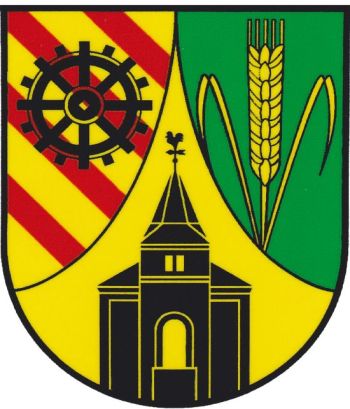Oberhonnefeld-Gierend: Difference between revisions
Jump to navigation
Jump to search
Knorrepoes (talk | contribs) (Created page with "{| class="wikitable" |- style="vertical-align:top;" |[[File:{{PAGENAME}}.jpg|center|350 px|alt=Wappen von {{PAGENAME}}/Arms (crest) of {{PAGENAME}}]] | '''Country''' : Germany 60 px|right<br><br><br> '''State''' : Rheinland-Pfalz60 px|right<br><br><br> '''District (Kreis)''' : Neuwied60 px|right<br><br><br><br> '''Verbandsgemeinde''': Verbandsgemeinde Rengsdorf-Waldbreit...") |
(No difference)
|
Revision as of 11:23, 4 December 2022
|
Country : Germany State : Rheinland-Pfalz District (Kreis) : Neuwied Verbandsgemeinde: Rengsdorf-Waldbreitbach (until 2018 Rengsdorf) |
| German | Gespalten durch eine eingebogene Spitze, darin eine schwarze Kirche in Vorderansicht, der Turm mit geöffnetem Rundbogentor, gespaltenem und geöffnetem Fenster im Glockengeschoss und spitzem, mit dem Wetterhahn besteckten Zeltdach; vorn achtmal schräggeteilt von Gold und Rot, belegt von einem achtspeichigen schwarzen Zahnrad; hinten in Grün eine dreizeilige goldene Ähre, der Halm mit zwei umgebogenen Blättern. |
| English | blazon wanted |
Origin/meaning
The arms were officially granted on June 3, 1981.
The gold and red bends are taken from the arms of the Counts of Wied and indicates that the municipality belonged to the property of the Counts of Wied. The cogwheel symbolizes the former iron and copper mines and smelters in the Honnefeld, which were in operation until the end of the 18th century.
The ear of wheat symbolizes the cultivation of grain, the green the wooded surroundings of the municipality. The church shown is intended to represent the evangelical parish church in Oberhonnefeld, a classical hall church.
Contact and Support
Partners:
Your logo here ?
Contact us
© since 1995, Heraldry of the World, Ralf Hartemink 
Index of the site













